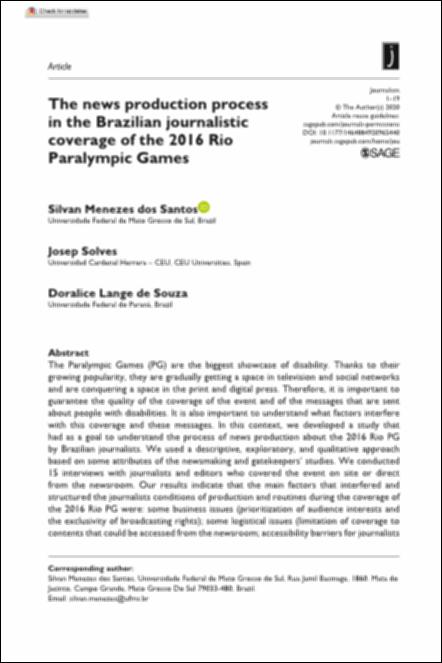Por favor, use este identificador para citar o enlazar este ítem:
http://hdl.handle.net/10637/14154The news production process in the Brazilian journalistic coverage of the 2016 Rio Paralympic Games
| Título : | The news production process in the Brazilian journalistic coverage of the 2016 Rio Paralympic Games |
| Autor : | Santos, Silvan Menezes dos Solves Almela, Josep Antoni Souza, Doralice Lange de |
| Materias: | Paralympics (15., 2016. Rio de Janeiro, Brazil); Juegos Paralímpicos (15., 2016. Río de Janeiro, Brasil); Sports journalism - 2016 - Brazil.; Mass media and sports - 2016 - Brazil.; Sports for people with disabilities - Brazil.; Periodismo deportivo - 2016 - Brasil.; Deportes para discapacitados físicos - Brasil.; Medios de comunicación social y deportes - 2016 - Brasil. |
| Editorial : | SAGE |
| Citación : | Santos, S. M. dos, Solves, J. & Souza, D. L. de. (2022). The news production process in the Brazilian journalistic coverage of the 2016 Rio Paralympic Games. Journalism, vol. 23, i. 6 (jun.), pp. 1319–1337. DOI: https://doi.org/10.1177/1464884920965440 |
| Resumen : | The Paralympic Games (PG) are the biggest showcase of disability. Thanks to their growing popularity, they are gradually getting a space in television and social networks and are conquering a space in the print and digital press. Therefore, it is important to guarantee the quality of the coverage of the event and of the messages that are sent about people with disabilities. It is also important to understand what factors interfere with this coverage and these messages. In this context, we developed a study that had as a goal to understand the process of news production about the 2016 Rio PG by Brazilian journalists. We used a descriptive, exploratory, and qualitative approach based on some attributes of the newsmaking and gatekeepers’ studies. We conducted 15 interviews with journalists and editors who covered the event on site or direct from the newsroom. Our results indicate that the main factors that interfered and structured the journalists conditions of production and routines during the coverage of the 2016 Rio PG were: some business issues (prioritization of audience interests and the exclusivity of broadcasting rights); some logistical issues (limitation of coverage to contents that could be accessed from the newsroom; accessibility barriers for journalists with disabilities; transportation between arenas, and reduced teams of journalists); and journalists’ level preparedness to cover the event. The interviews also revealed that the main news criteria for content selection were expected victories and medals, proximity, and curiosity. They said they emphasized content that valued athletes’ sportsmanship and narratives of overcoming adversity. |
| Descripción : | This is the peer reviewed version of the following article: Santos, S.M. dos, Solves, J. & Souza, D.L. de (2022). The news production process in the Brazilian journalistic coverage of the 2016 Rio Paralympic Games. Journalism, vol. 23, i. 6 (june 2022), pp. 1319?1337. Copyright © 2022 SAGE Publications. DOI: https://doi.org/10.1177/1464884920965440. Este es el post-print del siguiente artículo: Santos, S.M. dos, Solves, J. & Souza, D.L. de (2022). The news production process in the Brazilian journalistic coverage of the 2016 Rio Paralympic Games. Journalism, vol. 23, i. 6 (june 2022), pp. 1319?1337, que se ha publicado de forma definitiva en https://doi.org/10.1177/1464884920965440. Este artículo se encuentra disponible en la página web de la revista en la siguiente URL: https://journals.sagepub.com/doi/abs/10.1177/1464884920965440 |
| URI : | http://hdl.handle.net/10637/14154 |
| Derechos: | http://creativecommons.org/licenses/by-nc-nd/4.0/deed.es |
| ISSN : | 1464-8849 1741-3001 (Electrónico) |
| Fecha de publicación : | 15-jun-2022 |
| Centro : | Universidad Cardenal Herrera-CEU |
| Aparece en las colecciones: | Dpto. Comunicación e Información Periodística |
Los ítems de DSpace están protegidos por copyright, con todos los derechos reservados, a menos que se indique lo contrario.


